I have written two test classes (CryptUtilTest1.groovy, CryptUtilTest2.groovy) for the same tool class method. I mock StringImplUtils.emptyIfBlank method in CryptUtilTest2.groovy. When the two test classes are executed separately, the test classes can be executed normally. However, when the two test cases are executed together, the second test class sometimes has the following error:
> Task :CallServer:compileJava UP-TO-DATE
> Task :CallServer:compileGroovy NO-SOURCE
> Task :CallServer:processResources UP-TO-DATE
> Task :CallServer:classes UP-TO-DATE
> Task :CallServer:compileTestJava NO-SOURCE
> Task :CallServer:compileTestGroovy
> Task :CallServer:processTestResources UP-TO-DATE
> Task :CallServer:testClasses
> Task :CallServer:test
[INFO] TestableMock start at E:\isouceWork\VRBT_RCPA_V100R001C10\JAVA_CODE\CallServer
Misplaced or misused argument matcher detected here:
-> at org.codehaus.groovy.runtime.callsite.CallSiteArray.defaultCall(CallSiteArray.java:47)
You cannot use argument matchers outside of verification or stubbing.
Examples of correct usage of argument matchers:
when(mock.get(anyInt())).thenReturn(null);
doThrow(new RuntimeException()).when(mock).someVoidMethod(any());
verify(mock).someMethod(contains("foo"))
This message may appear after an NullPointerException if the last matcher is returning an object
like any() but the stubbed method signature expect a primitive argument, in this case,
use primitive alternatives.
when(mock.get(any())); // bad use, will raise NPE
when(mock.get(anyInt())); // correct usage use
Also, this error might show up because you use argument matchers with methods that cannot be mocked.
Following methods *cannot* be stubbed/verified: final/private/equals()/hashCode().
Mocking methods declared on non-public parent classes is not supported.
org.mockito.exceptions.misusing.InvalidUseOfMatchersException:
Misplaced or misused argument matcher detected here:
-> at org.codehaus.groovy.runtime.callsite.CallSiteArray.defaultCall(CallSiteArray.java:47)
You cannot use argument matchers outside of verification or stubbing.
Examples of correct usage of argument matchers:
when(mock.get(anyInt())).thenReturn(null);
doThrow(new RuntimeException()).when(mock).someVoidMethod(any());
verify(mock).someMethod(contains("foo"))
This message may appear after an NullPointerException if the last matcher is returning an object
like any() but the stubbed method signature expect a primitive argument, in this case,
use primitive alternatives.
when(mock.get(any())); // bad use, will raise NPE
when(mock.get(anyInt())); // correct usage use
Also, this error might show up because you use argument matchers with methods that cannot be mocked.
Following methods *cannot* be stubbed/verified: final/private/equals()/hashCode().
Mocking methods declared on non-public parent classes is not supported.
at com.huawei.callserver.utils.CryptUtilTest2.test(CryptUtilTest2.groovy:22)
Suppressed: java.lang.NullPointerException: Cannot invoke method close() on null object
at org.codehaus.groovy.runtime.NullObject.invokeMethod(NullObject.java:91)
at org.codehaus.groovy.runtime.callsite.PogoMetaClassSite.call(PogoMetaClassSite.java:44)
at org.codehaus.groovy.runtime.callsite.CallSiteArray.defaultCall(CallSiteArray.java:47)
at org.codehaus.groovy.runtime.callsite.NullCallSite.call(NullCallSite.java:34)
at org.codehaus.groovy.runtime.callsite.CallSiteArray.defaultCall(CallSiteArray.java:47)
at org.codehaus.groovy.runtime.callsite.AbstractCallSite.call(AbstractCallSite.java:125)
at org.codehaus.groovy.runtime.callsite.AbstractCallSite.call(AbstractCallSite.java:130)
at com.huawei.callserver.utils.CryptUtilTest2.$spock_feature_0_0(CryptUtilTest2.groovy:29)
at sun.reflect.NativeMethodAccessorImpl.invoke0(Native Method)
at sun.reflect.NativeMethodAccessorImpl.invoke(NativeMethodAccessorImpl.java:62)
at sun.reflect.DelegatingMethodAccessorImpl.invoke(DelegatingMethodAccessorImpl.java:43)
at java.lang.reflect.Method.invoke(Method.java:498)
at org.spockframework.util.ReflectionUtil.invokeMethod(ReflectionUtil.java:198)
at org.spockframework.runtime.model.MethodInfo.lambda$new$0(MethodInfo.java:47)
at org.spockframework.runtime.model.MethodInfo.invoke(MethodInfo.java:148)
at org.spockframework.runtime.PlatformSpecRunner.invokeRaw(PlatformSpecRunner.java:409)
at org.spockframework.runtime.PlatformSpecRunner.invoke(PlatformSpecRunner.java:392)
at org.spockframework.runtime.PlatformSpecRunner.runFeatureMethod(PlatformSpecRunner.java:326)
at org.spockframework.runtime.IterationNode.execute(IterationNode.java:48)
at org.spockframework.runtime.SimpleFeatureNode.execute(SimpleFeatureNode.java:58)
at org.spockframework.runtime.SimpleFeatureNode.execute(SimpleFeatureNode.java:15)
at org.junit.platform.engine.support.hierarchical.NodeTestTask.lambda$executeRecursively$5(NodeTestTask.java:139)
at org.junit.platform.engine.support.hierarchical.ThrowableCollector.execute(ThrowableCollector.java:73)
at org.junit.platform.engine.support.hierarchical.NodeTestTask.lambda$executeRecursively$7(NodeTestTask.java:129)
at org.spockframework.runtime.SpockNode.sneakyInvoke(SpockNode.java:40)
at org.spockframework.runtime.IterationNode.lambda$around$0(IterationNode.java:63)
at org.spockframework.runtime.PlatformSpecRunner.lambda$createMethodInfoForDoRunIteration$5(PlatformSpecRunner.java:238)
at org.spockframework.runtime.model.MethodInfo.invoke(MethodInfo.java:148)
at org.spockframework.runtime.PlatformSpecRunner.invokeRaw(PlatformSpecRunner.java:409)
at org.spockframework.runtime.PlatformSpecRunner.invoke(PlatformSpecRunner.java:392)
at org.spockframework.runtime.PlatformSpecRunner.runIteration(PlatformSpecRunner.java:220)
at org.spockframework.runtime.IterationNode.around(IterationNode.java:63)
at org.spockframework.runtime.SimpleFeatureNode.lambda$around$0(SimpleFeatureNode.java:52)
at org.spockframework.runtime.SpockNode.sneakyInvoke(SpockNode.java:40)
at org.spockframework.runtime.FeatureNode.lambda$around$0(FeatureNode.java:29)
at org.spockframework.runtime.PlatformSpecRunner.lambda$createMethodInfoForDoRunFeature$4(PlatformSpecRunner.java:201)
at org.spockframework.runtime.model.MethodInfo.invoke(MethodInfo.java:148)
at org.spockframework.runtime.PlatformSpecRunner.invokeRaw(PlatformSpecRunner.java:409)
at org.spockframework.runtime.PlatformSpecRunner.invoke(PlatformSpecRunner.java:392)
at org.spockframework.runtime.PlatformSpecRunner.runFeature(PlatformSpecRunner.java:194)
at org.spockframework.runtime.FeatureNode.around(FeatureNode.java:29)
at org.spockframework.runtime.SimpleFeatureNode.around(SimpleFeatureNode.java:52)
at org.spockframework.runtime.SimpleFeatureNode.around(SimpleFeatureNode.java:15)
at org.junit.platform.engine.support.hierarchical.NodeTestTask.lambda$executeRecursively$8(NodeTestTask.java:127)
at org.junit.platform.engine.support.hierarchical.ThrowableCollector.execute(ThrowableCollector.java:73)
at org.junit.platform.engine.support.hierarchical.NodeTestTask.executeRecursively(NodeTestTask.java:126)
at org.junit.platform.engine.support.hierarchical.NodeTestTask.execute(NodeTestTask.java:84)
at java.util.ArrayList.forEach(ArrayList.java:1257)
at org.junit.platform.engine.support.hierarchical.SameThreadHierarchicalTestExecutorService.invokeAll(SameThreadHierarchicalTestExecutorService.java:38)
at org.junit.platform.engine.support.hierarchical.NodeTestTask.lambda$executeRecursively$5(NodeTestTask.java:143)
at org.junit.platform.engine.support.hierarchical.ThrowableCollector.execute(ThrowableCollector.java:73)
at org.junit.platform.engine.support.hierarchical.NodeTestTask.lambda$executeRecursively$7(NodeTestTask.java:129)
at org.spockframework.runtime.SpockNode.sneakyInvoke(SpockNode.java:40)
at org.spockframework.runtime.SpecNode.lambda$around$0(SpecNode.java:63)
at org.spockframework.runtime.PlatformSpecRunner.lambda$createMethodInfoForDoRunSpec$0(PlatformSpecRunner.java:61)
at org.spockframework.runtime.model.MethodInfo.invoke(MethodInfo.java:148)
at org.spockframework.runtime.PlatformSpecRunner.invokeRaw(PlatformSpecRunner.java:409)
at org.spockframework.runtime.PlatformSpecRunner.invoke(PlatformSpecRunner.java:392)
at org.spockframework.runtime.PlatformSpecRunner.runSpec(PlatformSpecRunner.java:55)
at org.spockframework.runtime.SpecNode.around(SpecNode.java:63)
at org.spockframework.runtime.SpecNode.around(SpecNode.java:11)
at org.junit.platform.engine.support.hierarchical.NodeTestTask.lambda$executeRecursively$8(NodeTestTask.java:127)
at org.junit.platform.engine.support.hierarchical.ThrowableCollector.execute(ThrowableCollector.java:73)
at org.junit.platform.engine.support.hierarchical.NodeTestTask.executeRecursively(NodeTestTask.java:126)
at org.junit.platform.engine.support.hierarchical.NodeTestTask.execute(NodeTestTask.java:84)
at java.util.ArrayList.forEach(ArrayList.java:1257)
at org.junit.platform.engine.support.hierarchical.SameThreadHierarchicalTestExecutorService.invokeAll(SameThreadHierarchicalTestExecutorService.java:38)
at org.junit.platform.engine.support.hierarchical.NodeTestTask.lambda$executeRecursively$5(NodeTestTask.java:143)
at org.junit.platform.engine.support.hierarchical.ThrowableCollector.execute(ThrowableCollector.java:73)
at org.junit.platform.engine.support.hierarchical.NodeTestTask.lambda$executeRecursively$7(NodeTestTask.java:129)
at org.junit.platform.engine.support.hierarchical.Node.around(Node.java:137)
at org.junit.platform.engine.support.hierarchical.NodeTestTask.lambda$executeRecursively$8(NodeTestTask.java:127)
at org.junit.platform.engine.support.hierarchical.ThrowableCollector.execute(ThrowableCollector.java:73)
at org.junit.platform.engine.support.hierarchical.NodeTestTask.executeRecursively(NodeTestTask.java:126)
at org.junit.platform.engine.support.hierarchical.NodeTestTask.execute(NodeTestTask.java:84)
at org.junit.platform.engine.support.hierarchical.SameThreadHierarchicalTestExecutorService.submit(SameThreadHierarchicalTestExecutorService.java:32)
at org.junit.platform.engine.support.hierarchical.HierarchicalTestExecutor.execute(HierarchicalTestExecutor.java:57)
at org.junit.platform.engine.support.hierarchical.HierarchicalTestEngine.execute(HierarchicalTestEngine.java:51)
at org.junit.platform.launcher.core.EngineExecutionOrchestrator.execute(EngineExecutionOrchestrator.java:108)
at org.junit.platform.launcher.core.EngineExecutionOrchestrator.execute(EngineExecutionOrchestrator.java:88)
at org.junit.platform.launcher.core.EngineExecutionOrchestrator.lambda$execute$0(EngineExecutionOrchestrator.java:54)
at org.junit.platform.launcher.core.EngineExecutionOrchestrator.withInterceptedStreams(EngineExecutionOrchestrator.java:67)
at org.junit.platform.launcher.core.EngineExecutionOrchestrator.execute(EngineExecutionOrchestrator.java:52)
at org.junit.platform.launcher.core.DefaultLauncher.execute(DefaultLauncher.java:96)
at org.junit.platform.launcher.core.DefaultLauncher.execute(DefaultLauncher.java:75)
at org.gradle.api.internal.tasks.testing.junitplatform.JUnitPlatformTestClassProcessor$CollectAllTestClassesExecutor.processAllTestClasses(JUnitPlatformTestClassProcessor.java:99)
at org.gradle.api.internal.tasks.testing.junitplatform.JUnitPlatformTestClassProcessor$CollectAllTestClassesExecutor.access$000(JUnitPlatformTestClassProcessor.java:79)
at org.gradle.api.internal.tasks.testing.junitplatform.JUnitPlatformTestClassProcessor.stop(JUnitPlatformTestClassProcessor.java:75)
at org.gradle.api.internal.tasks.testing.SuiteTestClassProcessor.stop(SuiteTestClassProcessor.java:61)
at sun.reflect.NativeMethodAccessorImpl.invoke0(Native Method)
at sun.reflect.NativeMethodAccessorImpl.invoke(NativeMethodAccessorImpl.java:62)
at sun.reflect.DelegatingMethodAccessorImpl.invoke(DelegatingMethodAccessorImpl.java:43)
at java.lang.reflect.Method.invoke(Method.java:498)
at org.gradle.internal.dispatch.ReflectionDispatch.dispatch(ReflectionDispatch.java:36)
at org.gradle.internal.dispatch.ReflectionDispatch.dispatch(ReflectionDispatch.java:24)
at org.gradle.internal.dispatch.ContextClassLoaderDispatch.dispatch(ContextClassLoaderDispatch.java:33)
at org.gradle.internal.dispatch.ProxyDispatchAdapter$DispatchingInvocationHandler.invoke(ProxyDispatchAdapter.java:94)
at com.sun.proxy.$Proxy2.stop(Unknown Source)
at org.gradle.api.internal.tasks.testing.worker.TestWorker$3.run(TestWorker.java:193)
at org.gradle.api.internal.tasks.testing.worker.TestWorker.executeAndMaintainThreadName(TestWorker.java:129)
at org.gradle.api.internal.tasks.testing.worker.TestWorker.execute(TestWorker.java:100)
at org.gradle.api.internal.tasks.testing.worker.TestWorker.execute(TestWorker.java:60)
at org.gradle.process.internal.worker.child.ActionExecutionWorker.execute(ActionExecutionWorker.java:56)
at org.gradle.process.internal.worker.child.SystemApplicationClassLoaderWorker.call(SystemApplicationClassLoaderWorker.java:133)
at org.gradle.process.internal.worker.child.SystemApplicationClassLoaderWorker.call(SystemApplicationClassLoaderWorker.java:71)
at worker.org.gradle.process.internal.worker.GradleWorkerMain.run(GradleWorkerMain.java:69)
at worker.org.gradle.process.internal.worker.GradleWorkerMain.main(GradleWorkerMain.java:74)
Condition not satisfied:
"123" == CryptUtil.test("123")
| | |
| | null
| class com.huawei.callserver.utils.CryptUtil
false
Condition not satisfied:
"123" == CryptUtil.test("123")
| | |
| | null
| class com.huawei.callserver.utils.CryptUtil
false
at com.huawei.callserver.utils.CryptUtilTest2.test1(CryptUtilTest2.groovy:35)
CryptUtilTest2 > test FAILED
org.mockito.exceptions.misusing.InvalidUseOfMatchersException at CryptUtilTest2.groovy:22
CryptUtilTest2 > test1 FAILED
org.spockframework.runtime.SpockComparisonFailure at CryptUtilTest2.groovy:35
7 tests completed, 2 failed
> Task :CallServer:test FAILED
FAILURE: Build failed with an exception.
* What went wrong:
Execution failed for task ':CallServer:test'.
> There were failing tests. See the report at: file:///E:/isouceWork/VRBT_RCPA_V100R001C10/JAVA_CODE/CallServer/build/reports/tests/test/index.html
* Try:
Run with --stacktrace option to get the stack trace. Run with --info or --debug option to get more log output. Run with --scan to get full insights.
* Get more help at https://help.gradle.org
Deprecated Gradle features were used in this build, making it incompatible with Gradle 8.0.
You can use '--warning-mode all' to show the individual deprecation warnings and determine if they come from your own scripts or plugins.
See https://docs.gradle.org/7.2/userguide/command_line_interface.html#sec:command_line_warnings
BUILD FAILED in 17s
5 actionable tasks: 2 executed, 3 up-to-date
the separate result of two test class was shown as below:
CryptUtilTest1
CryptUtilTest2
gradle.build
testImplementation 'org.codehaus.groovy:groovy-all:3.0.7'
testImplementation group: 'org.spockframework', name: 'spock-core', version: '2.0-groovy-3.0'
testImplementation group: 'org.spockframework', name: 'spock-spring', version: '2.0-groovy-3.0'
testImplementation group: 'org.mockito', name: 'mockito-inline', version: '4.9.0'
my test code:
class CryptUtilTest1 extends Specification {
def "decrypt"() {
when:
def decryptStr = CryptUtil.decrypt("d2NjX2NyeXB0ATQxNDU1MzVGNDc0MzREOzMwMzE0NTMxMzAzNDQxMzYzODQzMzI0NDQzMzA0NjQyMzU0MTQ1NDIzNjQ2MzA0NTMwMzUzNDM2Mzc0NTQyNDE0MjM5MzQ0MjM4MzEzNTMxNDYzNTM0MzYzMDMxNDEzNDMwNDI0NDQxMzk0Mjs7MzEzMDMwMzA7QTk1MjBGNjVBNjg3MzE4MkZFNUExNkZDMDI5MDg5N0Q7QkQ5NzlDQUQ1MzkyQzdEMUJFQ0VFNEVENUNENDlGNDE7MzgzMDM1Mzg2MTY2MzMzMzJEMzQzNzYyMzAyRDM0MzQzNDM0MkQzODYxMzAzMjJENjQzNjM3NjI2NDYxMzg2NjMxNjE2NTYxOw==")
then:
decryptStr == "12345"
}
def "encryptAES256"() {
when:
def encryptStr = CryptUtil.encryptAES256(Mockito.anyString())
then:
encryptStr != ""
}
def "encryptByMD5"() {
when:
def encryptByMD5 = CryptUtil.encryptByMD5("133")
then:
encryptByMD5 == "9fc3d7152ba9336a670e36d0ed79bc43"
}
def "encryptByMD5Telecom"() {
when:
def encryptByMD5Telecom = CryptUtil.encryptByMD5Telecom("133")
then:
encryptByMD5Telecom == "1efb11cd74b5a654c8c6727736ea4ea0"
}
def "test"() {
when:
def testRes = CryptUtil.test("133")
then:
testRes == "133"
}
}
class CryptUtilTest2 extends Specification {
def test() {
given:
var mockedStatic = Mockito.mockStatic(StringImplUtils.class)
mockedStatic.when(() -> StringImplUtils.emptyIfBlank("123")).thenReturn("aaaa")
expect:
"aaaa" == CryptUtil.test("123")
cleanup:
mockedStatic.close()
}
def test1() {
expect:
"123" == CryptUtil.test("123")
}
}
public final class CryptUtil {
private static final Crypter CRYPTER = CrypterFactory.getCrypter();
private CryptUtil() {
}
public static String decrypt(String cipherText) {
return CRYPTER.decrypt(cipherText);
}
public static String encryptByMD5(String plainText) throws NoSuchAlgorithmException {
byte[] secretBytes = null;
secretBytes = MessageDigest.getInstance("md5").digest(plainText.getBytes(StandardCharsets.UTF_8));
String md5code = new BigInteger(1, secretBytes).toString(16);
int len = md5code.length();
for (int i = 0; i < 32 - len; i++) {
md5code = "0" + md5code;
}
return md5code;
}
public static String encryptByMD5Telecom(String str) throws NoSuchAlgorithmException {
byte[] res = str.getBytes(Charset.forName("UTF-8"));
MessageDigest digest = MessageDigest.getInstance("MD5");
byte[] result = digest.digest(res);
for (int i = 0; i < result.length; i++) {
digest.update(result[i]);
}
byte[] hash = digest.digest();
StringBuffer resultStr = new StringBuffer("");
for (int i = 0; i < hash.length; i++) {
int hex = hash[i] & 0xFF;
if (hex < 16) {
resultStr.append('0');
}
resultStr.append((Integer.toString(hex, 16)).toLowerCase(Locale.getDefault()));
}
return resultStr.toString();
}
public static String encryptAES256(String text) {
return CRYPTER.encrypt(text);
}
public static String test(String text) {
String testStr = StringImplUtils.emptyIfBlank(text);
return testStr;
}
When I use spock1.*+powermock to test, this probability error does not occur.


